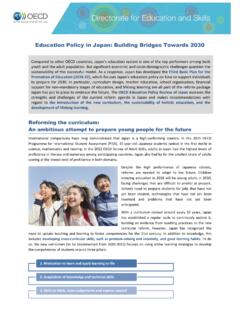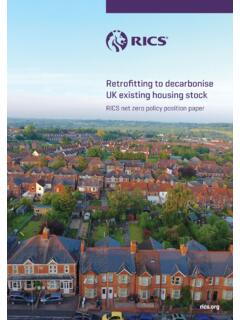Transcription of Unlocking Talent, Fulfilling Potential - GOV.UK
1 0 1 2 Unlocking Talent, Fulfilling Potential A plan for improving social mobility through education Presented to Parliament by the Secretary of State for Education and Minister for Women and Equalities by Command of Her Majesty December 2017 Cm 9541 3 Crown copyright 2017 This publication is licensed under the terms of the Open Government Licence except where otherwise stated. To view this licence, visit or write to the Information Policy Team, The National Archives, Kew, London TW9 4DU, or email: Where we have identified any third party copyright information you will need to obtain permission from the copyright holders concerned. This publication is available at Any enquiries regarding this publication should be sent to us at the Department for Education at ISBN 978-1-5286-0046-0 CCS0917075678 12/17 Printed on paper containing 75% recycled fibre content minimum Printed in the UK by the APS Group on behalf of the Controller of Her Majesty s Stationery Office 4 Contents Foreword 5 Introduction 6 ambition 1: Close the word gap in the early years 11 ambition 2: Close the attainment gap in school while continuing to raise standards for all 16 ambition 3: High quality post-16 education choices for all young people 23 ambition 4: Everyone achieving their Potential in rewarding careers 29 Opportunity Areas bringing together our approach to tackle entrenched disadvantage 35 Conclusion 36 5 Foreword Social mobility has characterised my own life.
2 And so this matters to me personally as well as politically. In our country today, where you start still all too often determines where you finish. And while talent is spread evenly across the country, opportunity is not. None of us should accept this. Everyone deserves a fair shot in life and a chance to go as far as their hard work and talent can take them. The good news is that we don t need to accept the status quo, it can be changed. We can break down the barriers that hold people back at every stage in their lif e. I am under no illusion that this will be easy there are no silver bullets. Nor can education tackle these challenges alone. But it can play a vital role equality of opportunity starts with education. This plan is about putting social mobility at the heart of education policy. We must raise standards for all. And to do so we are determined to leave no community behind and we will target our efforts and resources at the people and places that need it most.
3 I believe this is the smart thing to do for our country and our economy. But more importantly, it is the right thing to do. No one should be held back because of who they are or where they are born. This plan provides a framework for action that can empower everyone whether educators, government, business or civil society to help transform equality of opportunity in this country. Rt Hon Justine Greening 6 Introduction Levelling up opportunity We have a national mission to level up opportunity across this country and build a fairer society, one that will guarantee a better future for the next generation. Talent and hard work alone should determine how far people can go in life, whoever you are, wherever you are from. We have made big strides forward already. Employment has grown. We have made record investments in transport and infrastructure. And in education, our ambitious reforms are transforming opportunities for young people. We have unleashed innovation and choice in our schools, raised standards through a rigorous new curriculum and a world class exam system, and introduced a new, fairer National Funding Formula.
4 There are now million more children in good or outstanding schools since 2010;1 more young people each year going to our world class universities than ever before; and we have the highest proportion of 16- to 17-year-olds participating in education since records We should be proud of what this government has delivered so far. However, we must now go further, building on these strong foundations. Because we still face a defining challenge: while talent is spread evenly across this country, opportunity is not. Where you live will affect where you get to in life while in some areas opportunity can become self-perpetuating, in other communities, disadvantage can become entrenched. And, across the country, less-advantaged children fall behind their more affluent peers in the early years and the gaps widen throughout school and Opportunity breeds opportunity and, while early advantage accumulates, so too does early disadvantage. The good news though is that we know this can change we can reverse these negative spirals and generate a virtuous cycle to unlock talent and fulfil Potential .
5 Government has a key role in achieving this, providing the additional support that can help to lift up everyone, irrespective of who they are or where they live. Where our reforms are already transforming standards in particular in schools the key task now is to spread their impact to the areas of the country that need it most. And we must apply this same drive to raise standards to other equally important parts of education that have not yet had the same focus including the historically neglected area of technical education. Throughout, we must put greater emphasis on supporting and developing the key agents of improvement across our system: our teachers, leaders and other education and care professionals. A plan for improving social mobility through education We are under no illusion that these issues can be tackled quickly. Nor, importantly, can they be tackled by education alone. It will require a long-term, sustained commitment across government and beyond.
6 This plan focusing on the role of education in improving social 7 mobility will therefore sit at the core of the wider work of this government to spread equality of opportunity across the full range of its activity. And it is important to begin with the recognition that there is no simple solution. The temptation can often be to search for a silver bullet one idea, or one lever which if pulled would transform social mobility. But it is a myth that it can ever be that straightforward. And while of course money is important, if we could simply buy our way through these challenges we would have done so by now. To make a real difference, we must align our work and relentlessly focus our energy and resources to where it can have the greatest impact. This plan is an important step forward a targeted response to begin to direct effort and resource towards the places and people where it is most needed to unlock talent and fulfil Potential . The purpose of this plan is to bring together and give coherence to the steps we are taking and building on recent reforms to provide a platform for further action, injecting new urgency to our mission.
7 To support this, the document is structured around a set of guiding ambitions for our work. These are intended to focus and drive our activity and to provide a framework that everyone whether educators, government, business or civil society can be empowered to support to help to transform equality of opportunity in this country. The rest of this introduction will provide an overview of this structure. And the following chapters will identify a set of key challenges to achieving each ambition , setting out the actions we are taking to begin to overcome these. These actions will need to be built on consistently over time to have a transformative impact on what is, by definition, a generational challenge. But this plan marks a concerted approach to begin to level up opportunity right across the education system. No community left behind Firstly, we have an overarching ambition that spans the full plan: no community left behind. In Britain today, the community where you grow up will shape your chances of attending a good school and your wider educational and career outcomes.
8 Education and skills outcomes vary significantly across the country and are, in turn, one of the biggest drivers of regional variations in productivity. Areas with better education outcomes develop a higher skill base, higher productivity, greater economic returns and become more attractive to both highly skilled people and investment, building a capacity to improve even further. For areas with lower education outcomes, the reverse is the case they can become trapped in a low skills cycle. We want a race to the top instead. And we need to achieve that in communities with very different day to day challenges. We therefore need to put real emphasis on the places that are not yet Fulfilling their Potential and where resources and additional support are needed the most. In doing so, education can play an integral role in delivering our Industrial Strategy, helping to boost long-term prosperity and earning power in Britain after we exit the European Union. Because while tackling this challenge is first and foremost a moral imperative, it is also an economic one.
9 If disadvantaged pupils in all regions of this country performed as well as disadvantaged pupils in London, this would lead to an overall benefit to the UK economy of over 20 8 This core focus on place means a different way of approaching policy. Our national reforms to date have been fundamental to raising standards, but we now need to reflect that their impact has as yet been unevenly felt. And, due in part to their demand-led nature, they have meant that at times, resource and capacity has tended to flow to areas that are already ahead and able to push for more. We will continue these reforms, building on their success. But we must now also look at how they can be effectively targeted to have maximum impact in the areas that have yet to feel their full benefit. This plan sets out how our broad place-based targeting runs throughout all of our activity. This will sit alongside more intensive and coordinated support for a limited number of areas with entrenched challenges, through the Opportunity Areas programme.
10 Tackling the injustices that hold people back at each life stage To complement this overarching ambition , we are setting out four key life-stage ambitions, helping to direct support in the most effective way. These link closely to the influence of place , but also reflect the fact that right across the country less advantaged children are more likely to fall behind and struggle to catch-up. Even in good schools, disadvantaged pupils underperform; and even when they succeed in education, they achieve poorer career outcomes than their more affluent peers with the same ambition 1 Close the word gap in the early years. Good early years education is the cornerstone of social mobility and we are making record investment in this area. Children with strong foundations will start school in a position to progress, but too many children still fall behind early, and it is hard to close the gaps that emerge. We need to tackle these development gaps at the earliest opportunity, particularly focused on the key early language and literacy skills, so that all children can begin school ready to thrive.

















